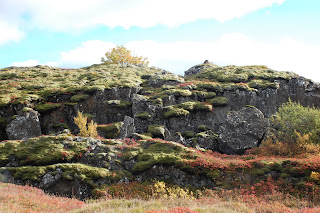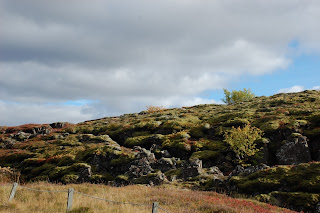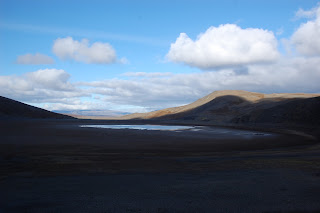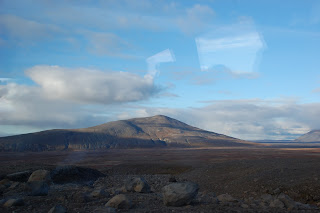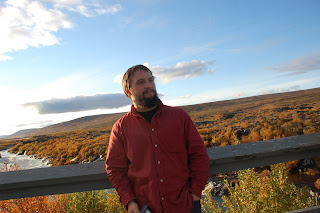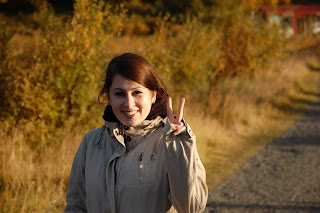I woke up this morning, drank my daily allotment of vitamin C (As the head councilor of the university pointed out at orientation: you come to Iceland, you get sick. Period. So it's good to make sure your piss is as brilliant a color as you can manage) and, it being a weekend, set about whatever intellectual tasks my soul inclined me towards. On the weekdays I tend to eat first thing and watch The Daily Show-remind myself I'm American, for better or worse. I worked on my novel, a scene endeavoring to give it both more depth and more violence (win win!). Breakfast came eventually, cereal, because it's only marginally overpriced and milk is cheap, and everyone but the Englishman is generally too lazy to make porridge. In the morning or evening there's some Latin too, on most days, generally a sentence or two of Saxo, viciously (and time-consumingly) wrestled with with the aid of my fancy Danish edition of the Latin text, my favorite online dictionary, and my amusingly archaic free Kindle translation.
Then, while on weekends I got to class and thence to the gym, today I wandered off to the library. Wherein I discovered the book I was intending to read (Sverre Bagge's latest From Viking Stronghold to Christian Kingdom) was already in use, with another person ahead of me. So I worked on some paradigms (middle voice of ja-stem verbs, subjunctive and indicative, present and preterite, and personal pronouns) and finished the last chapter of Eric Christiansen's The Norsemen in the Viking Age. It's interested to read somebody like Bagge (Got through the first hundred pages yesterday) who on some level defines, at least for a youngin' like me, the traditional historical narrative of Norway, alongside someone like Christiansen, who's almost playfully iconoclastic and not (as far as I've been told and myself observed) really a specialist in anything he writes about. It's in the nature of the field that everyone writes in a distinctly speculative style, tossing out the occasional far-fetched idea every so often, sometimes noting how unlikely it is, sometimes just trying to slip it in. It's a necessary evil-history is not a science, our sources suck, and this whole field of study would be boring as hell if no one got creative with it every now and then.
So, in a sense, there's not that much of a distinction between different sides of any argument, except in the sense that there is good (i.e. carefully, skillfully done) scholarship and bad (i.e. lazy, uncritical) scholarship. So Bagge is emphasizing in his work the classic teleology of Norwegian medieval history: the change from a territory of sea-born warlords to a medieval state with an established kingship and complex associated institutions. He add what appears to be a popular emphasis these day, the importance of continental influence, and comparisons between Norway and the influencers and that other periphery, Eastern Europe. He has lots of those standbys of historical scholarship in our age of literary deconstruction: "this seems more likely" and "this probably happened" and "his intention must have been". But he uses them as gracefully as they can be used.
Cristiansen, writing more of an archaeological/syncronic survey, with lots of runic and place name evidence, throws most of that out, in an attempt to get at what's actually happening in the viking age, not two hundred years later. He disagrees fundamentally with almost every scholar he brings up, makes fun of most of their ideas, and generally tries to destroy the teleology of a Viking Age catalyst of social/political/religious development that Bagge (and most everyone else) is so fond of. He discounts, generally, the importance and likeliness of institutional anything, centralized anything, and anything happening all of the sudden in the eight and ninth centuries. Christianity, kingship, the modern territories of Scandinavia, all had been developing since the Migration Period, he says, and there's nothing special about the Viking Age that suddenly made them more "real" or "complete" or "developed" than before.
And while one could easily make the argument that Bagge is a better historian, Christiansen certainly isn't a bad scholar, so you end up having to live more or less with both of them. Lacking the option of scientific proof, very few well thought out ideas can actually be completely discounted-the discourse seems to be a constantly expanding field, rather than a really changing one. Particularly with ideas and perspectives that seem (to my amateur eyes, at least) to be of near equal quality, like these. But even, to some extend, with the bad ideas. I mean, Christiansen spends pages discounting the idea of ancient Germanic sacral kingship, as many scholars before him have done, with good reason (It's based on piss-poor evidence of miniscule quantity), yet it still gets brought up every so often, and still needs to be defended against.
So yeah, that's my rant for the week. We're all just a bunch of romantic, linguistically inclined nerds who demanded that someone pay us for our trouble, while we run in circles laughing gleefully. Like game designers with more class, and better vests.
Sunday, September 25, 2011
Friday, September 23, 2011
The Inland West, Þingvellir, and Reykholt
Massive photo dump. The end result of the trip was a bit dull-A very finely made museum with nothing in it. But we were at Snorri Sturluson's own farm, by his own hotspring, standing outside the cellar where he was murdered. Something to be said for that. And a possible site of the law-rock. It is massive, because I only had the heart to delete so many pictures.
I realize after the fact that Erin, Sara, Bond, Haraldr, and James' behind sort of dominate the few pictures of people here. Apologies to them, if any of them happen to stumble on this-I'm not trying to stalk you any more than is natural. You're just the photogenic ones. There were more pictures of Paul, but I deleted them because he's ugly. The landscape speaks for itself-I would offer captions, but that would take a truly absurd amount of time. The land has the quality of Oregon mountains after clearcut, or any other landscape with all the life stripped from it. If Mars wasn't so red I imagine it would like a bit like the interior of Iceland. But it's lovely, all the same, and makes you feel for the people stuck here with little but their bleating, stinky sheep, their disgruntled Irish slaves with the murderous glint in their eyes, their buried silver and their rocky soil during the long, dark winters, with little to do but try to think up alliterative trios.
Subscribe to:
Comments (Atom)


































